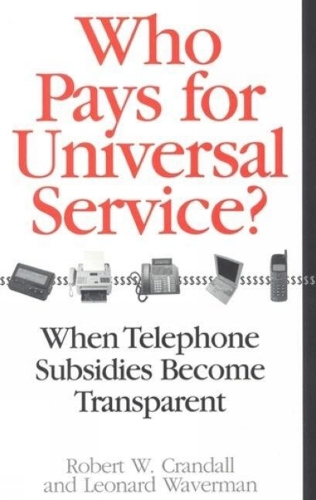
Who Pays for Universal Service: When Telephone Subsidies Become Transparent
(Paperback)
Publishing Details
Who Pays for Universal Service: When Telephone Subsidies Become Transparent
By (Author) Robert W. Crandall
By (author) Leonard Waverman
Bloomsbury Publishing PLC
Brookings Institution
1st June 2000
United States
Classifications
Professional and Scholarly
Non Fiction
Political economy
384.630973
Physical Properties
Paperback
216
Width 152mm, Height 229mm, Spine 12mm
308g
Description
This text aims to show that subsidised residential telephone access has little effect on telephone subscriptions in America while it has harmful consequences on the overall value of services. The authors argue that the universal sevice subsidy will have to change as a result of the 1996 Telecommunications Act: subsidies should be paid from intrastate taxes on telecom services and paid directly to carriers or subscribers.
Author Bio
Robert W. Crandall is a senior fellow in the Economic Studies program at the Brookings Institution, where his research has focused on telecommunications and cable television regulation, industrial organization and policy, and the changing regional structure of the U.S. economy. His previous books include Broadband: Should We Regulate Internet Access (Brookings, 2002), Telecommunications Liberalization on Two Sides of the Atlantic (Brookings, 2001) and Who Pays for Universal Service (Brookings, 2000). Leonard Waverman is professor of economics and director of the Centre for International Studies at the University of Toronto.
